- Home
- Susan Hill
Betrayal of Trust Page 21
Betrayal of Trust Read online
Page 21
They each took hold of her under an arm, hauled her up and walked her between them out of the room.
‘A …’ she whispered. ‘Ag …’
‘Can you get it now?’
Lorraine shook her head. ‘I don’t think it’s a name. I think it’s just noises.’
Olive went on making them, deep in her throat.
When Lenny arrived in the late afternoon Olive was asleep, lying on her bed, shoes off, the covers pulled loosely over her, groaning softly.
‘Is she all right?’
‘Yes. She had a bit of a fall this morning – she tripped over the step coming in from the garden so it was better to let her rest. Dr Fison looked her over and she wasn’t hurt but you can’t be too careful. Do you want to sit with her?’
Lenny touched the hand that was splayed out from under the coverlet. It was the colour of wax, the nails pale and cut short. Her hands. She had loved those hands. Loved to stroke the soft backs of them, link her own little finger in one of Olive’s.
‘Should she be making that noise?’
‘She’s just snoring, bless her.’
‘She doesn’t snore.’
‘Most old people snore.’
‘I said she doesn’t snore. I should know. What have you given her?’
‘After a shock like that a wee sedative is a good idea – calming, you know.’
‘You’ve no right to stupefy her with drugs. She can’t protest, she doesn’t know.’
Moira Fison spoke very carefully. Patiently. ‘I would never use the word “stupefy”, Miss Wilcox.’
‘Oh, I would.’
‘You see, Olive was very agitated earlier. She was worrying over this name – she was asking for Agatha.’
‘There’s no one called Agatha,’ Lenny said, pushing past the woman. Behind her, Olive, lay too still, too deeply asleep, the yellow-white hand outstretched and limp against the covers.
He was coming up the stairs as she went down and Lenny would have pushed past him too. She had met him once, the day she had brought Olive, and had disliked him but only because she disliked all doctors, disliked the way they assumed power, claimed superior knowledge, passed judgement. He had talked plausibly about new ideas, new ways of caring for dementia patients, new approaches, stimulation, one-to-one care, small steps, memory hints, making the best of … Lenny could have trotted it all back at him. She hadn’t believed much of it. Nothing here seemed different from any of the other places except that it was new, the carpets were still shedding fluff, the paint smelled. Give it time, she knew, give it only a very short time and it would smell of pee and Listerine and stewing meat, the same as they all did.
She got into the van. A treecreeper was going up the trunk of an ash tree nearby, a bird she had rarely seen and one that Olive had tried over years to attract to their own garden without success. This one was camouflaged against the trunk and only its deft, expert movement upwards gave it away. Lenny watched.
‘Come here, quick,’ she would have said. ‘Look, O, isn’t that what you’ve always wanted to see?’
And Olive would have come over, her movements neat and purposeful as the bird’s, taken up the binoculars that were always on the window ledge, and focused them.
‘It is, isn’t it?’ Lenny would have said, and after a moment’s excited, waiting silence, breath held, Olive would have turned to her, lowering the glasses, her face lit with her particular smile, eyes slightly narrowed, as if against the bright sun – what Lenny had always called her ‘giving smile’.
Thirty-one
‘RACHEL?’
‘Oh …’
‘Sorry, is this a bad time?’
‘It’s just … I’m on my way to Kenneth’s room. He’s in bed, he hasn’t been well.’
‘I’ll hang up.’
‘No, don’t …’
‘I can call you again?’
‘No – I don’t mean no, I mean, no, listen … don’t go. Hang on.’ Her voice was muffled. She said a word or two. Then footsteps. ‘Sorry. I’m in the kitchen. Simon?’
‘I’m still here.’
‘I’m sorry.’
‘What for? You don’t have to apologise … I – I just wanted to hear your voice.’
‘And me. Me yours, I mean. I hear enough of my own.’
‘I can’t believe that. Anyway, I’m sorry – I’d better go.’
‘No, don’t, please don’t. It seems ages.’
‘It is. Are you all right?’
‘Yes. It’s just, when Ken gets ill he gets more ill because of the Parkinson’s – he only had a cold but it’s now a chest infection. I was just taking him a drink. He’s got so many blasted drugs he has to take … Sorry. You don’t want to hear me talk about my husband.’
‘I’ve told you, I just want to hear you talk. Can I see you?’
Silence.
‘Rachel, I know I shouldn’t ring you and I know I shouldn’t ask to see you but I so want to. I so need to.’
Eventually, she said ‘Yes’, very quietly.
‘When?’
‘I meant, I want to see you. I need to. As well.’
‘Can we?’
‘I don’t know … it’s difficult at the moment …’
‘Just a drink? Just for an hour?’
‘It wouldn’t be an hour though, would it?’
‘It would. Anything you say. I can set my watch. Please.’
‘I’ll ring. You’re busy, aren’t you?’
‘Yes, but I do get time off.’
‘Can I ring then, when I see a way?’
‘He’ll be fine, won’t he? Your husband. He’s got antibiotics presumably … all that.’
‘It takes him longer to recover … not like you and me.’
‘No.’
‘I’m always terrified for him.’
He was silent.
‘Simon?’
‘I understand.’ He did but he hated that he did.
‘Listen … he’s my husband. I’m responsible for him.’
‘I know that. Of course I do. What kind of a shit do you think I am? I know you have to put him first, I know that.’
‘I don’t think you’re any kind of a shit, I think you’re …’
‘What? Rachel? What do you think of me?’ It was the only thing in the world he wanted to know. Was desperate to know.
‘I have to go. Sorry. I’ll ring you. I promise I’ll ring.’
‘Simon, it’s Judith.’
‘Yes. How are you?’
‘Your formal tone. Are you on duty?’
‘I’m always on duty.’
‘No you’re not. You’re annoyed with me and I don’t altogether blame you but can we meet all the same? Always better to be annoyed face to face, I find.’
‘I’m pretty up to my eyes.’
‘Yes, but you have to eat. Your father’s out tomorrow night so I wondered if you and I could have a quiet supper somewhere.’
‘When you say “somewhere” …’
‘I meant I could do without cooking and this house isn’t conducive to our having the best conversations, is it?’
‘I suppose not.’
‘I’m sure not. So – may I take you out to supper at that nice Italian place of yours? It worked for us before.’
‘You’re making it sound as if we’ve fallen out over something.’
‘I rather think we might have, don’t you? Crossed wires and misunderstandings anyway.’
‘Hmm.’
But she was right. He was just finding it hard to admit, as ever.
‘I‘d like to. Should be fine, but things are surfacing at odd times on this Lowther case so there’s a chance I might have to cry off.’
‘There is always a chance you might have to do that, isn’t there?’
‘I’ll pick you up.’
‘That would be lovely, then I can have a drink or two and get a taxi home. Thank you, darling.’
His mother had called him that. Now Judith. No one else, other than this woman or t
hat, to whom the word came easily and meant little. It was not an endearment word he used himself.
‘Is everything all right?’
‘Talk about it tomorrow. You?’
‘Talk tomorrow.’
He had told her about Rachel, and what he had not told, Judith had deduced, from his face, his tone of voice, and from the silences between the half-uttered phrases. She was the only person he could have told and he didn’t know what reaction he had expected from her – certainly not anything like the one he would have got from Cat. She had listened with care and said little but he had sensed hesitation, a holding back of something – sympathy? Approval? He had needed both. He realised that he always did. But Judith did not rush into anything and so he had flared up, wishing he had never spoken to her, tense and irritable and confused about his feelings. They had parted on abrasive terms.
She had dressed with some care, he thought, as they took her coat in the restaurant. His mother had dressed elegantly and strikingly, Judith was always well presented but drew little attention to herself with her clothes. Tonight, though, she had a black top with a deep red silk stole, a black-and-gold heavy necklace. People glanced round.
But when they were sitting opposite one another at his favourite table in the window, he saw that her eyes were sad, that she had concealed the shadows and hollows beneath them, that she had lost enough weight for it to show in her face – and she had not needed to lose it.
He ordered a bottle of prosecco.
‘Peace offering?’
‘Guilt offering,’ Simon said. ‘But we don’t need an excuse.’
The menus came, the old-fashioned huge menus, with the slip of paper clipped to the bottom on which the specials of the day were handwritten, the menus that went with the time warp within which the restaurant operated to serve the best food in Lafferton.
They ordered a large dish of antipasti. The wine came. Bottles of water. Chunks of fresh bread. The bowl of deep green olive oil.
Simon waited. The restaurant was busy, as always, but at this table they could talk without being overheard, they had a space to themselves. The candlelight reflected in the window.
I want to be here with Rachel, he thought. I have to bring her here tomorrow or the next day, somehow I have to seal things by bringing her here.
Would she come back to the flat? It was not a question he had ever needed to ask. He had always decided if women he knew were invited there or not. It was not automatic, but if he did ask them, it had never occurred to him that they might say no. None ever had.
Rachel might.
Judith drank some wine before she said, ‘It’s easier here. You know I’ve never been a tearful person – I don’t mean I’ve never cried – of course I have – but not very often in front of other people.’
‘You mean you want to cry now?’
‘I don’t want to. I’m afraid I might.’
Her hand was on the table and he put his own over it for a moment, as much to steady himself as her. He had had a moment of sudden chill.
‘Judith?’
They were silent as the platter of antipasti was set down.
‘Not often comfort food is also such good food,’ she said. ‘It’s all right, darling, don’t look so stricken, I’m not about to announce a divorce.’
‘Now that’s a relief.’
‘Did you really think …?’
‘For a second.’
She shook her head. ‘I love Richard. I do love him very much. I love him in quite a different way from the way I loved Don – when I married Don, I was twenty-two, he was the first man I ever looked at seriously, and we had over thirty years and two children together. Of course it’s different.’
‘I’m coming to the conclusion that’s always true. All love is different.’
‘In a sense. But something happened and it’s shifted the ground on which our marriage stands. That’s your phone.’
He went outside to take the call. It was a mild evening and there were people strolling down through the Lanes, couples, groups of the young, two girls pushing bikes. It was a world into which nothing harmful should intrude.
‘Guv? Woman on the special line. Wants to talk to you. Wouldn’t tell me any more. Sounded agitated. Said she’d seen the recon. Hung up.’
‘You got a number?’
‘No, trying to trace the call. But she’s going to ring again later tonight.’
‘Did she say when?’
‘No. Could be any time.’
‘OK – listen, I’m eating out. If she calls again ask her if she’ll ring back at ten o’clock tonight. I’ll be home. Put her through to my landline. And keep tracing. Anything else?’
‘A few other calls, nothing that sounds up to much.’
‘Thanks.’
As he turned to go back into the restaurant the phone rang again.
‘Simon? Paula Devenish. Any chance you could come and see me tomorrow morning?’
‘Of course. How are you?’
‘Stir-crazy, but threatened with dire consequences if I set foot in a police station. Half past ten?’
‘Sorry, Judith.’
‘I got them to hold back our main course but they’ll bring it now. Unless you have to go?’
‘No. All in hand.’
Her halibut and his fegato alla veneziana arrived with a flourish. Simon topped up her glass. He looked directly at her as she drank.
‘So. You should tell me,’ he said.
‘Yes.’ Judith flushed slightly, not with the wine. ‘Right. You know how your father can be – he says something, apparently out of the blue, though it rarely is. I’ve learned that he will have been brooding about it for hours – days sometimes. The more significant the thing, the more he is inclined to drop it from a great height. It can make him seem insensitive.’
‘He is insensitive.’
‘No, Simon, he isn’t. I know how it is between you two and I wouldn’t dare to tell you that you don’t know him, or that you are wrong about him. The man you have known since you were born is the man you know in a way only you can – well, you and the other two. But I know him pretty well now, and the point is, I know him differently. I haven’t the childhood baggage and that makes for a clearer view.’
‘Whatever. But now he’s said something which has clearly upset you. Doesn’t sound sensitive to me.’
‘He isn’t good at timing. I‘d just had a long phone conversation with Vivien, who keeps going from one unhappy relationship to the next, and right after that, one with Emma – you know, she has the new bookshop? – and she appears to be doing exactly the same.’
An image of Emma flashed into Simon’s mind. He’d found her attractive – but not very. And that had been before Rachel. Emma? He couldn’t even remember her last name.
Judith was looking down at her plate.
‘So I was feeling a bit battered. He must have known – he must have heard me. I came off the phone and put the dish of lamb chops on the table and he said, “Martha’s death wasn’t natural, you know. I can’t remember if I’ve told you this. Her mother took the decision that Martha’s life was no life.”’ She spoke so quietly that Simon had to lean forward to catch every word. ‘He told me that you knew.’
‘Yes.’ He finished half his glass of wine in one go, before he could trust himself to say anything and his hand shook as he did so. ‘Yes,’ he said. ‘I knew.’
‘Simon …’
‘But I can’t believe he told you.’
‘Well, I’m his wife now, aren’t I? Maybe it’s as simple as that.’
‘If that’s the case, why didn’t he tell you before now? Why not even before you were married to him? Had you been talking about Martha?’
‘No. He never talks about her. Simon, your father has barely so much as mentioned her name in all the time I’ve known him. I don’t know why he came out with what he did, let alone at that particular moment or in that way, but I know I wish he hadn’t. I so wish that. He should never, eve
r have said any of it. That should have remained something between him and Meriel. But not me. It’s a family matter in which I have no part and I shouldn’t be made to have one.’
He knew she meant it. She had never attempted to discover things about their past nor felt that she had any right to be told them. So far as Judith was concerned, her life in the Serrailler family began with her marriage to his father. It was one of the things that, once he understood it, had brought him round to liking and respecting her – albeit late in the day.
‘What did you say to him?’
‘I was very angry. I have never been so angry. I couldn’t sit down at the table and eat with him, I had to go out … I just stood there in the dark, I didn’t know when I might be able to go back into the house and face him.’
‘When did you?’
‘I don’t know – it must have been half an hour. It was a long time. I walked around … I was shaking so much … I couldn’t think. The worst part was when I went back – he’d eaten supper by himself, he’d cleared away and gone off into his study. I went to bed … I was trying to read but not taking in a word. I knew we’d have to talk but I couldn’t face it that night. I just turned over and pretended to be asleep. That old one.’
‘Did he try to wake you?’
‘No.’
‘Next day?’
‘He got up and made the tea – just brought the tray up as usual, and the newspaper. And …’ She looked at him.
‘And,’ Simon said, ‘he carried on as if nothing had happened.’
‘Yes.’
‘Jesus, don’t I know that one. I know every word of the script. God knows it was played out often enough at home. I don’t know how my mother stood it. I couldn’t, nor could Ivo. It’s what my father did time after time – dropped something in the middle of a perfectly pleasant normal occasion, breakfast or Sunday lunch or when everyone was in the garden, anything, so long as we were all together and happy. And bang. Crump. The sound of a bomb going off, scattering everyone, shaking us up, horrifying us … you see? You see what he’s like? I thought you’d changed things.’
‘Yes,’ Judith said. ‘I thought I had too.’
‘Have you talked to him about it since?’
‘No. I can’t. For the first time, I don’t know how, I don’t know where I could possibly begin.’

 Mrs De Winter
Mrs De Winter A Question of Identity
A Question of Identity The Various Haunts of Men
The Various Haunts of Men The Pure in Heart
The Pure in Heart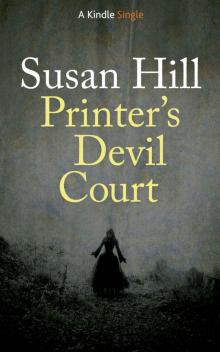 Printer's Devil Court
Printer's Devil Court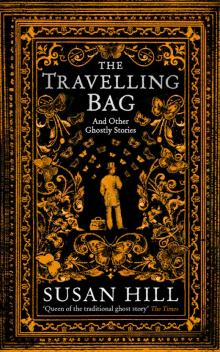 The Travelling Bag
The Travelling Bag The Risk of Darkness
The Risk of Darkness A Kind Man
A Kind Man Black Sheep
Black Sheep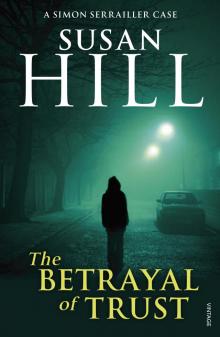 The Betrayal of Trust
The Betrayal of Trust The Service of Clouds
The Service of Clouds Betrayal of Trust
Betrayal of Trust The Small Hand
The Small Hand Dolly
Dolly Jacob's Room Is Full of Books: A Year of Reading
Jacob's Room Is Full of Books: A Year of Reading The Vows of Silence
The Vows of Silence The Soul of Discretion
The Soul of Discretion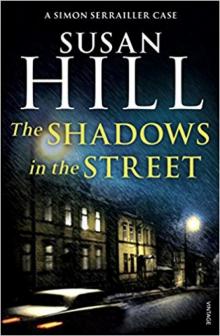 The Shadows in the Street
The Shadows in the Street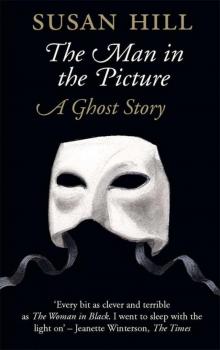 The Man in the Picture
The Man in the Picture Air and Angels
Air and Angels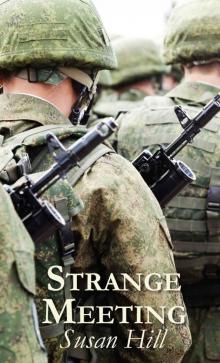 Strange Meeting
Strange Meeting In the Springtime of the Year
In the Springtime of the Year Howards End Is on the Landing: A Year of Reading From Home
Howards End Is on the Landing: A Year of Reading From Home From the Heart
From the Heart Old Haunts
Old Haunts The Mist in the Mirror
The Mist in the Mirror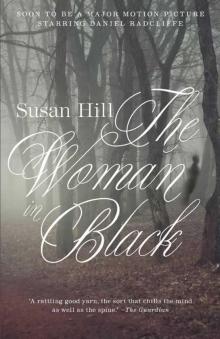 The Woman in Black: A Ghost Story
The Woman in Black: A Ghost Story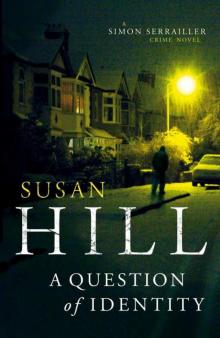 A Question of Identity (Simon Serrailler 7)
A Question of Identity (Simon Serrailler 7) The Comforts of Home
The Comforts of Home Mist in the Mirror
Mist in the Mirror Jacob's Room is Full of Books
Jacob's Room is Full of Books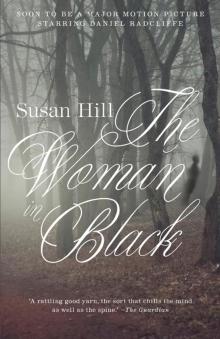 The Woman in Black
The Woman in Black Howards End is on the Landing
Howards End is on the Landing